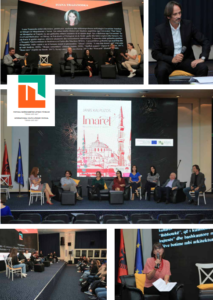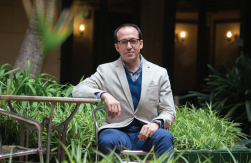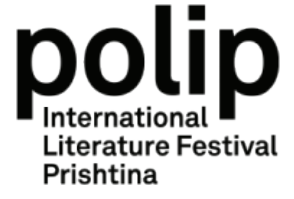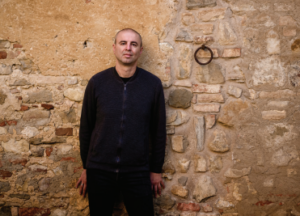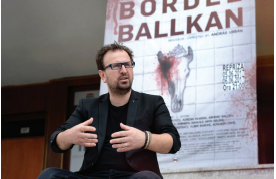Ag Apolloni, Albanian writer from Kosovo, participated in the literary festival Tirana Gate. The text we are publishing was read by him in
this festival, and is compound by excerpts from his is homonymous novel
While the others slept and snored, she had gazed into the darkness. She had prayed so fervently to God, but her prayers had not reached heaven. She’d prayed in her room and in the chapel, and for nothing. She knew, she must have known, Paul’s letter to the Corinthians, in which the body of man is seen as the temple of God. If it was as the apostle’s epistle said, then how could God have let the bodies of her sons become crumbs and embers? How could he sit there with the killers unpunished? There was a meadow nearby filled with crosses and graves: four hundred temples desecrated and heaven made no murmur. Thirteen thousand people had been killed in the war, another twenty thousand or so raped; so, more than thirty thousand temples profaned, and still the heavens were silent and the earth was indifferent.
She’d loved life a lot, back when she had her sons, even back when she at least had hope. For whoever wants to save his life will lose it, as the gospel told her. And now what was life to her, without Milan and Gjovalin? Such a life was only worth hating. He who hates his life in this world shall keep it to life eternal.
Tuesday had still not dawned, and she’d opened the door, taken the matches from the chimney, and gone downstairs and into the cellar. It was a mess down there, but her determination had found the red petrol can in the end. Of the ten litres the can held, there were three litres or so left.
It was enough.
Because it was still early, when she’d gone out into the yard she’d taken a stick from the fence and put a couple of stones in her coat pocket so she had something to ward off any dogs.
Strangely, not even the dogs in her own house heard her leaving like a shadow. No one had seen her. They were all sleeping. It was still dark. Like that – with stones in her pocket, the petrol can in one hand and a stick in the other – she went out of the yard, walked through the silhouettes of the trees and made for the graves at Meja. She trod like a phantasm between night and day, the moment when night has ended and day has not yet begun.
She’d sat down at the graves of her sons, which were in the first row. Seated on their tomb she made lament over her dead children. She straightened the flowers and wreaths, she caressed the gravestones, she spoke to them, and then she set off again, towards home. Towards home, but not for home. When she reached the halfway point between the house and the graves – between the living and the dead, where she’d left the can and the matches – she left the road and walked into the meadow. A few steps farther on she stopped by a fence, overgrown with shrubs and thorns. She took the lid off the can. She drenched herself in petrol. She threw the can aside and picked up the box of matches. She turned her face towards the graves, where her hopes had been buried, and with iron resolution she lit the match.
***
As we travel along the road named for the conciliator of feuding Albanians, I ask myself: could there ever be a conciliator to reconcile two hostile nations? Through the window, I see Donja in her yard and I say to myself: now that we’ve gone, what will she do?
Should she stay in and watch a film?
No, she used to watch them with Armend.
Should she go to the holiday resort at Deçan?
No, she used to go there with the children.
Should she go to Landovica?
No, she used to go there with her husband.
Should she go to Ulqin?
No, she used to go there with her husband and the children.
Should she stay in the yard and water the flowers?
Yes. And, together with them, her memories.
She used to go out, walk, chat, laugh, until one day it was Saturday and the door closed on her, to let her out no more. The day that stopped. The accursed day. The Saturday. That terrible Saturday. That eternal Saturday.
The days pass and repeat; only Saturday stays the same. It never passes. It stopped twenty years ago. You can visit Ferdonija’s home during the week, but as soon as you enter you’re in her Saturday. One day of hers is stronger than all of your days. She swallows the other days, transforms them into one, one black Saturday.
Sitting there, listening to her story, looking at her photographs, you feel as if you’re slowly being transformed inside. Like the Niobe of myth, who felt her whole organism stiffening within until she was entirely turned to stone, looking at her you feel yourself unstiffening, weakening, crumbling inwardly. Our Niobe is a rock before which we weep. Struck by fate, turned into a heroine, she is the strength that we lack. With her suffering and her endurance she stands higher than us, like all tragic heroines.
No, they shall not die as long as she lives. And when she is no longer here, they shall be, because she’s taken care of this too – putting up the memorial plaque and turning the house into the museum. We’ve put up a plaque. You’re not lost, none of you… You are forever – here. Forever. So long as earth and sun shall last you shall abide.
And so, day by day, year by year, all other inclinations dwindle and there remains but one: waiting. All other dreams have disintegrated, and there remains but one: return. All the other members of the family have disappeared and there remains but one: mother. All the other days drop away and there remains but one: Saturday.
Twenty years of Saturday. Saturday unending.
***
Pashka set fire to herself because of indifference. Hers were the best of sons, and she wanted to tell the world this. The enemy had taken them, had killed them, just like all the rest, no different. They threw them in a sack just like all the rest, no different. The soldiers buried them just like all the rest, no different. This failure to distinguish, so indifferent, was more than she could bear. Her sons, she believed, were the best; they’d been different while they were alive, and different they should be now they were dead. She bore her grudge not only against the indifferent world that had treated everyone alike; she felt it even more strongly against God. How could he possibly have remained indifferent to her prayers and to the crimes against her boys? Before she died, something inside her had died. Already for her, it wasn’t a heaven up there but a shroud. And so that morning she walked up the road and sat by a bush and set herself on fire. Had there been a Moses in the mountains thereabouts, he’d have seen a burning bush. A bush burning the God within her, like a lover who kills her beloved because she can’t endure her own jealousy or his indifference.
Thus Pashka burned herself and burned death. The great stone set there in her memory will one day crumble; it will one day be forgotten. But her deed shall live on as long as that indifferent heaven remains above. And as long as she is remembered, her two sons shall also be remembered. She set herself on fire to wrench them out of forgetting, out of indistinction, out of the anonymity of the victims. There was a little egoism in the deed, a little narcissism, a little altruism, a little fanaticism, a little humanism, a little barbarism. Her fire is an echo of the call of the wild. She speaks not with words but with flames. She doesn’t want to moralize, so she lets the fire speak for her, the fire that springs from her burned heart. The fire demands attention for burned hearts.
By burning herself, Pashka saved Ferdonija too. She showed that mothers who await the return of their sons and daughters can run out of patience, and so we shouldn’t take our eyes off them. Two years later, Ferdonija too buried two sons. But there was that message from Pashka, insisting that we take care of Donja, that even though we can’t avoid pain there needn’t be another suicide. The first woman, of the fire, saved the second woman, of the stone. Away with the flame, for hope still flickers! And if one day the other sons return in the same form, there will still be hope: hope that they’re happy in heaven and unforgotten on earth.
The names of the two women hint at their fates. Pashka passed over her yard, the fields, the graves and the road and rose from the temporal to the eternal. And Ferdonija remains – as in the Turkish root of her name, ferdane – alone and unique.
Pashka and Ferdonija, two pains of the same tragedy. They remain like the credits of a film made at the end of the last century. One stopped forever in a meadow, between graves and home. One stops at home and has been stopped there these twenty years. One stopped on her Tuesday, the other on her Saturday. And how can these mothers move forwards, when the future is behind them?
Translated from Albanian by Robert Wilton
